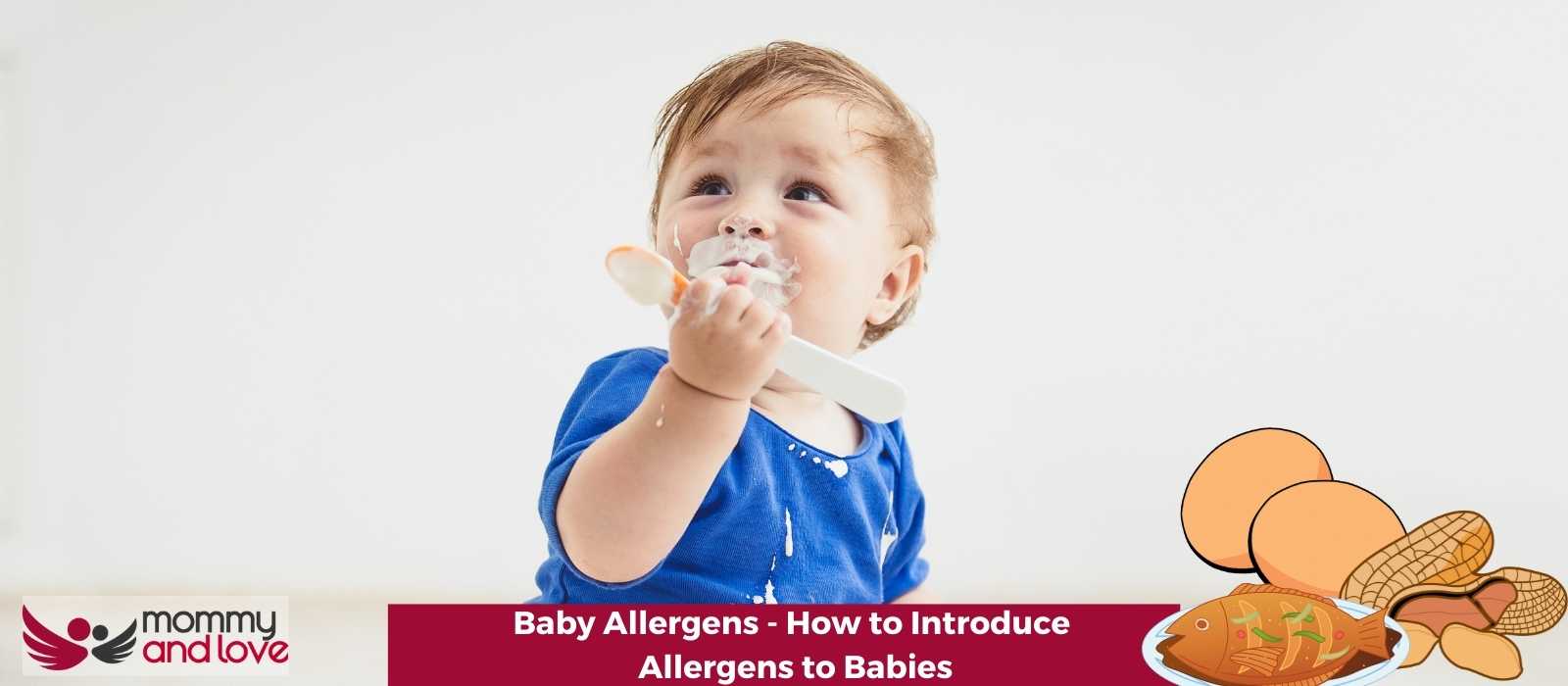With so many headlines screaming about the dangers of food allergies – particularly for young children and babies, it’s little wonder that many parents are reluctant to give foods such as peanuts, eggs and fish to their little ones for the first time.
But here’s the good news…
Where previously, parents were told to hold off on giving the best known and major allergens to babies until they’d reached the age of three, research has now proven the exact opposite.
A 2015 study of allergens showed that introducing peanuts to at-risk babies at an early stage could actually reduce the risk of developing an allergy by a staggering 81%,
Put another way, delaying the introduction of common allergens, the research showed, could actually increase the likelihood of allergies developing.
As a result of this ground-breaking study in food allergy research, many healthcare professionals are now suggesting – if not recommending – to introduce allergens early and ideally before a baby turns one. to help with food allergy prevention.
What are the top 9 allergens for babies?
At present, the nine most common potential allergens in US diets are:
- Eggs
- Milk
- Peanuts
- Shellfish
- Fish
- Wheat
- Tree nuts
- Soy
- Sesame
Sesame Allergy
You may be a little surprised to see sesame on the list, but the fact is that it has recently been recognised as a more common allergen and so, as a result, will be added to the list of common allergens in January 2023.
This will cause some anxiety in many parents as sesame is often not listed on food labels!
Egg Allergy

Eggs are a relatively common allergen and, for this reason, need to be introduced with care.
Some research has suggested that the best way to do this is to give your baby cooked egg in small amounts as part of their usual diet rather than in an ‘allergic’ form such as an egg white or an omelette. When doing baby led weaning, you can just chop up a hard boiled egg as the best method.
This will help your baby to get used to the taste and texture of eggs and can also help to reduce the risk of an allergic reaction. Egg allergies are one of the most common food allergies in babies, affecting around 2% of infants.
Peanut Allergy
Peanuts are one of the most common allergens and, as a result, parents are often very anxious about giving them to their babies for the first time when they are introducing solid foods.
The good news is that, according to the latest research, introducing peanuts early on can actually help to reduce the risk of developing peanut allergy.
One way of doing this is togive your baby peanut-containing foods such as smooth peanut butter, peanut sauce or crushed peanuts.
Cow’s Milk Allergy
Cow’s milk allergy is a common problem, affecting around 2% of babies and will usually mean all dairy foods are included.
It usually develops before twelve months of age and most babies outgrow it by the time they reach school age. Symptoms of a cow’s milk allergy can include diarrhoea, vomiting, eczema and wheezing.
Which Babies Are at Risk of Developing food allergies?
In terms of those babies most at risk, the simple fact is that anyone can develop a food allergy at any time in their life. There are, however, certain risk factors that you may be able to identify early in your baby’s life.
If your baby has, for example, eczema, which appears as dry, itchy patches on the skin, then they are at increased risk of being affected by food allergies.
Similarly, if you discover early on that your baby has an allergy to, say, milk, then they will have a higher risk of developing other food allergies.
As with the 2015 research contradicting previous advice on introducing babies to certain allergens, the old adage of a baby more at risk of food allergies if there is a family history has also been turned on its head.
Many allergy specialists are now recommending that siblings of babies with food allergies can introduce common food allergens at home without any pre-testing as long as they are not at high risk due to a pre-existing food allergy or severe eczema.
So, when and how should you introduce your baby to allergenic foods?
The first thing you need to do when you reach this stage is to relax. If you’re feeling particularly concerned or anxious about taking this step, then there is help available.
You could, for example, make an appointment with a pediatric allergist to discuss having your introduction to a particular food supervised. This may make you feel more supported and less anxious.
When you introduce solid foods or finger foods, you should ensure that when baby eats new foods you are keeping a track of baby’s diet so that you can track any reactions. This is especially important when introducing allergens into baby’s usual food.
Keeping it small
If you’re feeling a little anxious about the process, then start with the smallest amount of the allergen you can possibly use. This means that, if there was to be a reaction, you will be minimizing it.
You could, for example, add 1/8 of a teaspoon of a finely-ground tree nut to your baby’s rice or oatmeal when eating solid foods. Put simply, the smaller the quantity of the potential allergen, the less severe any reaction may be.
Remember too that not all babies will react to an allergen on their first exposure to it, so it’s vitally important that you continue to keep serving sizes small until you are 100% confident that your baby isn’t having an allergic reaction, and is food allergies safe.
If no reaction occurs, then simply work your way up to larger servings of the particular allergen.
One at a time
Another hard and fast rule is to only introduce one food allergen to your baby at a time. By doing this, if your baby does experience a reaction, you’ll know for definite which food was responsible.
Having said that, you really only need to expose your baby to an allergen for a few days at a time to know if there is going to be a reaction, so you could still introduce a couple each week. Remember early introduction is key!
Some parents also rub food on the baby’s skin to see if that forms a response. You can then try a little bit on the baby’s lip before you introduce to baby’s regular diet.
For breastfed babies, early introduction of the food via breast milk may also help.
Early does it!
When you’re introducing your baby to allergens, it’s a good idea to serve them early in the morning. This is because the majority of allergic reactions occur within two hours of ingestion and, in fact, often within minutes.
By introducing the allergen as early as you can in the day, you’ll be able to observe your baby throughout the day. Also, if your baby does experience an allergic reaction, it will be easier to contact healthcare professionals – whether for treatment for a reaction or for advice.
Before you introduce potential allergens to your baby, you need to know how to recognize the symptoms of an allergic reaction – whether it’s a mild or severe one.
Remember that symptoms can vary from baby to baby and, as has already been stated, may only appear on the second or on subsequent exposures, so keep a close eye until you’re 100% sure that your baby is not affected by an allergen.
Symptoms of mild allergic reactions

So, in terms of allergic reactions, what symptoms should you be looking out for?
If your baby experiences mild symptoms of an allergic reaction, then they’re likely to experience one of the following.
(Note that a mild reaction should only involve ONE of the followings, as more than one symptom would indicate a more severe reaction.)
- Itchy mouth
- A few hives, with mild itching
- Itchy nose or runny nose accompanied by sneezing
Symptoms of severe allergic reactions
As the word ‘severe’ would indicate, serious reactions may include any of the following – either in isolation or in combination with other symptoms:
- Swelling of face, lips or tongue
- Shortness of breath, wheezing, repetitive cough
- Pale or bluish skin
- Repeated vomiting
- Widespread hives
If you think your baby is experiencing a severe allergic reaction, then it’s vital that you contact emergency services immediately or seek immediate medical attention.
Take Away on Introducing Allergenic Foods to Babies
Introducing potential allergens to your baby can be a daunting task, but it’s important that you do so in a safe and controlled manner. By following the tips we’ve outlined in this article – such as introducing one allergen at a time, serving them early in the day, and knowing how to recognize the symptoms of an allergic reaction – you can minimize the chances of your baby experiencing an adverse reaction.
No matter when you introduce solid foods, its important to give your baby a wide and varied diet and not just the same foods. From 12 months of age you need to ensure they are getting a healthy and nutritious diet, including plenty of iron rich foods. We recommend introducing allergens early, in fact when you start baby led weaning and there is no need to avoid certain foods unless told to do so by health professionals.

This article was written by Sandra Baker – full time writer and the mother of four amazing kids (including twins!)
She’s also a breastfeeding counselor and has spent years helping new parents learn how to care for their children. When she’s not writing or caring for her children, Sandra likes to spend time reading and taking walks with her husband.




